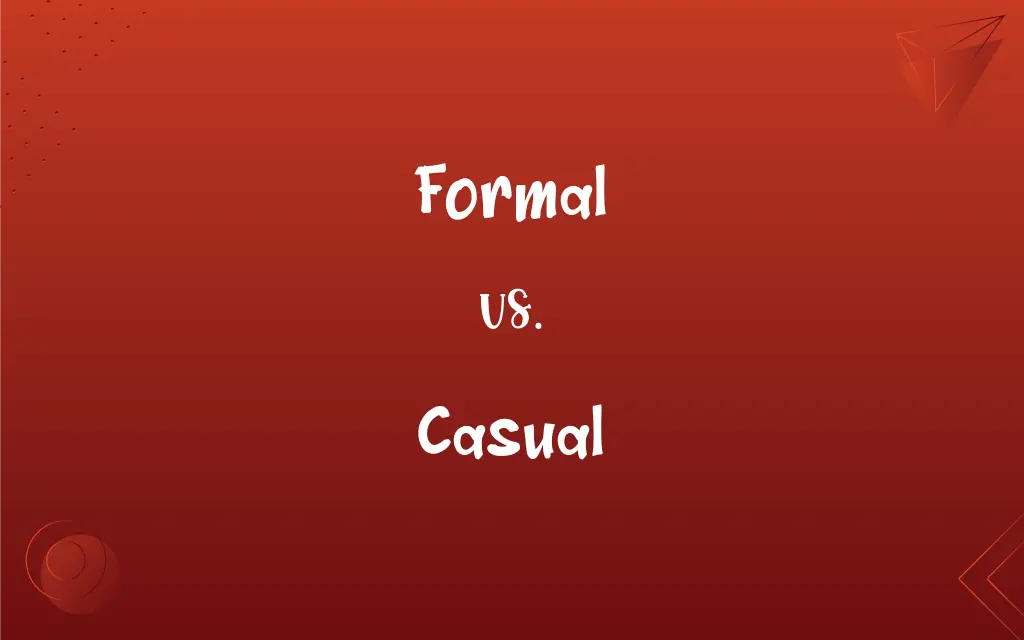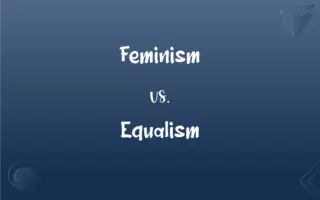Formal vs. Casual: What's the Difference?
Edited by Harlon Moss || By Janet White || Published on November 14, 2023
Formal pertains to established conventions or seriousness, while Casual denotes an informal or relaxed manner.

Key Differences
Formal typically signifies adherence to established rules, conventions, or etiquettes. In the realms of communication, attire, or events, being formal often suggests a structured, traditional, or professional approach. Casual, in contrast, denotes a more relaxed, laid-back, or unconstrained attitude, implying a lack of strict adherence to norms or standards.
In language, a formal tone is used in professional, academic, or official settings and adheres to grammar rules meticulously. Casual language, on the other hand, is commonplace in familiar settings among friends or peers and might include colloquialisms or slang.
When considering attire, formal wear might consist of suits, gowns, or attire suitable for ceremonies or official functions. Casual wear typically includes everyday clothing like jeans, t-shirts, or other relaxed outfits, ideal for regular or leisurely activities.
Similarly, in events or gatherings, a formal event might be an official ceremony, a structured meeting, or an elaborate wedding. In contrast, a casual event could be an impromptu get-together, a relaxed barbecue, or a simple birthday celebration.
In interpersonal relationships, a formal interaction might be between a student and a professor, an employee and a boss, or between strangers. A casual relationship, however, is often observed among friends, close colleagues, or family members, characterized by informal communication and behavior.
ADVERTISEMENT
Comparison Chart
Language Use
Adheres to grammar rules meticulously.
Uses colloquialisms or slang.
Attire
Includes suits, gowns, ceremonial wear.
Comprises everyday clothing like jeans, t-shirts.
Event Type
Official ceremonies, structured meetings.
Impromptu get-togethers, barbecues.
Relationship Interaction
Between strangers, in professional settings.
Among friends, family, close colleagues.
Expected Behavior
Adherence to conventions or etiquettes.
Relaxed, unconstrained attitude.
ADVERTISEMENT
Formal and Casual Definitions
Formal
Pertaining to ceremonial or official occasions.
He wore a formal suit to the wedding.
Casual
Relaxed and unconstrained.
They had a casual conversation over coffee.
Formal
Reflecting professionalism or seriousness.
The letter had a formal tone, addressing the board of directors.
Casual
Informal or not following established norms.
He wore casual attire to the informal gathering.
Formal
Relating to or involving outward form or structure, often in contrast to content or meaning.
Casual
Laid-back or easygoing in nature.
The team's casual approach led to unforeseen challenges.
Formal
Being or relating to essential form or constitution
A formal principle.
Casual
Being without ceremony or formality; relaxed or informal
A casual evening with friends.
Formal
Following or being in accord with accepted or prescribed forms, conventions, or regulations
Had little formal education.
Went to a formal party.
Casual
Unpremeditated or offhand
A casual remark.
Formal
Characterized by strict or meticulous observation of forms; methodical
Very formal in their business transactions.
Casual
Suited for everyday wear or informal use
Casual clothing.
Formal
Stiffly ceremonious
A formal greeting.
Casual
Not serious or thorough; superficial
A casual inspection.
A casual understanding of French.
Formal
Characterized by technical or polysyllabic vocabulary, complex sentence structure, and explicit transitions; not colloquial or informal
Formal discourse.
Casual
Showing little interest or concern; nonchalant
"speaks with casual aplomb about being shot at" (Janelle Brown).
Formal
Having the outward appearance but lacking in substance
A formal requirement that is usually ignored.
Casual
Occurring or being such by chance
"in the first months when I was pregnant, before it was obvious to the casual observer" (Anne Roiphe).
Formal
Something, such as a gown or social affair, that is formal in nature.
Casual
Occurring at irregular or infrequent intervals; occasional
Casual employment at a factory.
A casual correspondence with a former teacher.
Formal
Being in accord with established forms.
She spoke formal English, without any dialect.
Casual
Employed on an irregular basis
Casual workers.
Formal
Official.
I'd like to make a formal complaint.
Despite efforts by limnologists and freshwater biologists to create a formal definition of “pond”, there is still no universal distinction between a “pond” and a “lake.”
Casual
Socialized with only occasionally; not close or intimate
A casual acquaintance.
Formal
Relating to the form or structure of something.
Formal linguistics ignores the vocabulary of languages and focuses solely on their grammar.
Casual
Being or occurring between sexual partners who are not in an established relationship
Casual lovers.
Casual sex.
Formal
Relating to formation.
The formal stage is a critical part of any child's development.
Casual
One that serves or appears at irregular intervals, especially a temporary worker.
Formal
Ceremonial or traditional.
Formal wear must be worn at my wedding!
Casual
Casuals Casualwear
Sent my casuals to the cleaners.
Formal
Proper, according to strict etiquette; not casual.
He's always very formal, and I wish he'd relax a bit.
Casual
A soldier temporarily attached to a unit while awaiting permanent assignment.
Formal
Organized; well-structured and planned.
When they became a formal club the rowers built a small boathouse.
Casual
Happening by chance.
They only had casual meetings.
Formal
(mathematics) Relating to mere manipulation and construction of strings of symbols, without regard to their meaning.
Formal series are defined without any reference to convergence.
Casual
Coming without regularity; occasional or incidental.
The purchase of donuts was just a casual expense.
Formal
(clothing) An evening gown.
Casual
Employed irregularly.
He was just a casual worker.
Formal
An event with a formal dress code.
Jenny took Sam to her Year 12 formal.
Casual
Careless.
Formal
(programming) A formal parameter.
Casual
Happening or coming to pass without design.
Formal
(Oxbridge slang) formal hall.
Casual
(of behavior, usage, or milieu) Informal; relaxed.
Tone in casual interactions
Formal
(uncountable) Formalin.
Casual
(of clothing or utensils) Designed for informal or everyday use.
Business casual
Pants in the casual wear collection
Formal
An acetal formed from formaldehyde.
Casual
A worker who is only working for a company occasionally, not as its permanent employee.
Formal
See Methylal.
Casual
A soldier temporarily at a place of duty, usually en route to another place of duty.
Formal
Belonging to the form, shape, frame, external appearance, or organization of a thing.
Casual
A member of a group of football hooligans who wear expensive designer clothing to avoid police attention; see casual (subculture).
Formal
Belonging to the constitution of a thing, as distinguished from the matter composing it; having the power of making a thing what it is; constituent; essential; pertaining to or depending on the forms, so called, of the human intellect.
Of [the sounds represented by] letters, the material part is breath and voice; the formal is constituted by the motion and figure of the organs of speech.
Casual
One who receives relief for a night in a parish to which he does not belong; a vagrant.
Formal
Done in due form, or with solemnity; according to regular method; not incidental, sudden or irregular; express; as, he gave his formal consent.
His obscure funeral . . . No noble rite nor formal ostentation.
Casual
A player of casual games.
The devs dumbed the game down so the casuals could enjoy it.
Formal
Devoted to, or done in accordance with, forms or rules; punctilious; regular; orderly; methodical; of a prescribed form; exact; prim; stiff; ceremonious; as, a man formal in his dress, his gait, his conversation.
A cold-looking, formal garden, cut into angles and rhomboids.
She took off the formal cap that confined her hair.
Casual
(fandom slang) A person whose engagement with media is relaxed or superficial.
Formal
Having the form or appearance without the substance or essence; external; as, formal duty; formal worship; formal courtesy, etc.
Casual
A tramp.
Formal
Dependent in form; conventional.
Still in constraint your suffering sex remains,Or bound in formal or in real chains.
Casual
Shoes suitable for everyday use, as opposed to more formal footwear.
Formal
Sound; normal.
To make of him a formal man again.
Casual
Happening or coming to pass without design, and without being foreseen or expected; accidental; fortuitous; coming by chance.
Casual breaks, in the general system.
Formal
Being in accord with established forms and conventions and requirements (as e.g. of formal dress);
Pay one's formal respects
Formal dress
A formal ball
The requirement was only formal and often ignored
A formal education
Casual
Coming without regularity; occasional; incidental; as, casual expenses.
A constant habit, rather than a casual gesture.
Formal
Characteristic of or befitting a person in authority;
Formal duties
An official banquet
Casual
One who receives relief for a night in a parish to which he does not belong; a vagrant.
Formal
(of spoken and written language) adhering to traditional standards of correctness and without casual, contracted, and colloquial forms;
The paper was written in formal English
Casual
Marked by blithe unconcern;
An ability to interest casual students
Showed a casual disregard for cold weather
An utterly insouciant financial policy
An elegantly insouciant manner
Drove his car with nonchalant abandon
Was polite in a teasing nonchalant manner
Formal
Represented in simplified or symbolic form
Casual
Without or seeming to be without plan or method; offhand;
A casual remark
Information collected by casual methods and in their spare time
Formal
Logically deductive;
Formal proof
Casual
Suited for everyday use;
Casual clothes
Everyday clothes
Formal
Refined or imposing in manner or appearance; befitting a royal court;
A courtly gentleman
Casual
Occurring or appearing or singled out by chance;
Their accidental meeting led to a renewal of their friendship
Seek help from casual passers-by
A casual meeting
A chance occurrence
Formal
Adherence to established conventions.
The conference demanded a formal dress code.
Casual
Hasty and without attention to detail; not thorough;
A casual (or cursory) inspection failed to reveal the house's structural flaws
A passing glance
Perfunctory courtesy
Formal
Characterized by methodical and organized structure.
The meeting followed a formal agenda.
Casual
Employed in a specified capacity from time to time;
Casual employment
A casual correspondence with a former teacher
An occasional worker
Formal
Rigid in form or design.
The dining setup was formal, with an array of cutlery.
Casual
Characterized by a feeling of irresponsibility;
A broken back is nothing to be casual about; it is no fooling matter
Casual
Natural and unstudied;
Using their Christian names in a casual way
Lectured in a free-and-easy style
Casual
Not showing effort or strain;
A difficult feat performed with casual mastery
Careless grace
Casual
Occurring by chance or without planning.
They had a casual meet-up at the mall.
Casual
Temporary or not serious.
She had a casual job during her summer break.
FAQs
Why is Formal language important?
It conveys respect, professionalism, and is often expected in official settings.
Can a conversation be both Formal and Casual?
While distinct, a conversation can transition between formal and casual tones.
Which setting typically demands Formal behavior?
Professional settings, ceremonies, or when addressing authority figures.
What is Formal?
Formal relates to established conventions, seriousness, or professionalism.
Can one wear Casual attire to a Formal event?
Generally, it's inappropriate and may be seen as disrespectful.
How does Formal writing differ from Casual writing?
Formal writing avoids slang, adheres to grammar rules, and is objective, while casual writing is more relaxed.
How does Casual differ from Formal?
Casual denotes an informal, relaxed, or unconstrained manner.
Do all cultures value Formality similarly?
No, perceptions of formality can vary widely across cultures.
What are examples of Formal events?
Graduations, official ceremonies, or business meetings.
Is a Casual approach always negative?
No, in some settings, being casual fosters a relaxed and open environment.
How can one transition from a Formal to Casual tone in conversation?
By introducing lighter topics or using more relaxed language.
Is Casual the opposite of Formal?
In many contexts, yes, casual denotes a lack of formality.
When is Casual communication preferable?
Among friends, in relaxed settings, or when fostering open dialogue.
Is it essential to recognize when to be Formal?
Yes, it ensures respect and appropriateness in varied settings.
How has the distinction between Formal and Casual evolved with digital communication?
Digital communication, especially on social media, tends to be more casual, but formal digital communication is still prevalent in professional emails or official platforms.
Is Casual speech filled with grammatical errors?
Not necessarily, but it might include colloquialisms or regional phrases.
Can Casual relationships become Formal over time?
Yes, relationships can evolve based on circumstances or changing dynamics.
Can business meetings ever be Casual?
Yes, especially in more relaxed company cultures or during team-building exercises.
Why might someone prefer Casual attire?
For comfort, personal style, or the nature of an event.
How do Formal and Casual attire differ?
Formal attire is more structured and refined, while casual is relaxed and everyday.
About Author
Written by
Janet WhiteJanet White has been an esteemed writer and blogger for Difference Wiki. Holding a Master's degree in Science and Medical Journalism from the prestigious Boston University, she has consistently demonstrated her expertise and passion for her field. When she's not immersed in her work, Janet relishes her time exercising, delving into a good book, and cherishing moments with friends and family.
Edited by
Harlon MossHarlon is a seasoned quality moderator and accomplished content writer for Difference Wiki. An alumnus of the prestigious University of California, he earned his degree in Computer Science. Leveraging his academic background, Harlon brings a meticulous and informed perspective to his work, ensuring content accuracy and excellence.
































































